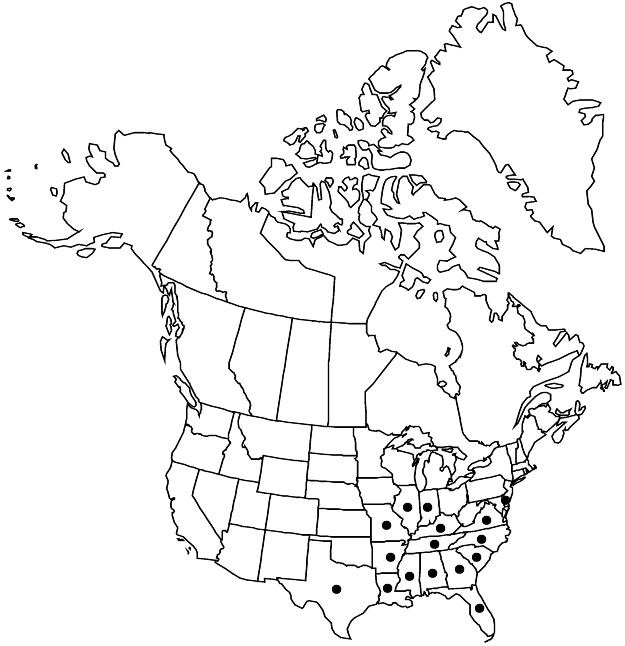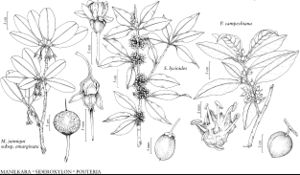Difference between revisions of "Sideroxylon lycioides"
Sp. Pl. ed. 2, 1: 279. 1762 ,.
FNA>Volume Importer |
imported>Volume Importer |
||
| (4 intermediate revisions by 2 users not shown) | |||
| Line 7: | Line 7: | ||
}} | }} | ||
|common_names=Buckthorn bully | |common_names=Buckthorn bully | ||
| + | |special_status={{Treatment/ID/Special_status | ||
| + | |code=F | ||
| + | |label=Illustrated | ||
| + | }}{{Treatment/ID/Special_status | ||
| + | |code=E | ||
| + | |label=Endemic | ||
| + | }} | ||
|basionyms= | |basionyms= | ||
|synonyms={{Treatment/ID/Synonym | |synonyms={{Treatment/ID/Synonym | ||
|name=Bumelia lycioides | |name=Bumelia lycioides | ||
|authority=(Linnaeus) Persoon | |authority=(Linnaeus) Persoon | ||
| + | |rank=species | ||
}} {{Treatment/ID/Synonym | }} {{Treatment/ID/Synonym | ||
|name=Bumelia lycioides var. ellipsoidalis | |name=Bumelia lycioides var. ellipsoidalis | ||
|authority=R. B. Clark | |authority=R. B. Clark | ||
| + | |rank=variety | ||
}} {{Treatment/ID/Synonym | }} {{Treatment/ID/Synonym | ||
|name=Bumelia lycioides var. virginiana | |name=Bumelia lycioides var. virginiana | ||
|authority=Fernald | |authority=Fernald | ||
| + | |rank=variety | ||
}} {{Treatment/ID/Synonym | }} {{Treatment/ID/Synonym | ||
|name=Bumelia smallii | |name=Bumelia smallii | ||
| − | |authority= | + | |authority= |
| + | |rank=species | ||
}} | }} | ||
|hierarchy=Sapotaceae;Sideroxylon;Sideroxylon lycioides | |hierarchy=Sapotaceae;Sideroxylon;Sideroxylon lycioides | ||
| Line 44: | Line 55: | ||
-->{{#Taxon: | -->{{#Taxon: | ||
name=Sideroxylon lycioides | name=Sideroxylon lycioides | ||
| − | |||
|authority=Linnaeus | |authority=Linnaeus | ||
|rank=species | |rank=species | ||
| Line 58: | Line 68: | ||
|publication title=Sp. Pl. ed. | |publication title=Sp. Pl. ed. | ||
|publication year= | |publication year= | ||
| − | |special status= | + | |special status=Illustrated;Endemic |
| − | |source xml=https:// | + | |source xml=https://bitbucket.org/aafc-mbb/fna-data-curation/src/2e0870ddd59836b60bcf96646a41e87ea5a5943a/coarse_grained_fna_xml/V8/V8_496.xml |
|genus=Sideroxylon | |genus=Sideroxylon | ||
|species=Sideroxylon lycioides | |species=Sideroxylon lycioides | ||
Latest revision as of 23:44, 5 November 2020
Shrubs or trees, to 14 m. Stems not armed or armed, glabrous. Leaves deciduous; petiole 3–14 mm, glabrous; blade (dull to lustrous dark green adaxially), elliptic to ovate or oblanceolate, 30–122 × 13–50 mm, base acute to attenuate, margins plane, apex usually acute to acuminate, sometimes rounded, surfaces glabrous or sometimes glabrate abaxially, venation visible, midrib villous (hairs white), slightly raised, marginal vein absent. Inflorescences 7–40-flowered. Pedicels 2–10 mm, glabrous. Flowers: calyx 1.3–3.1 mm diam., sepals 5(–6), 1.6–2.4 × 0.8–1.9 mm, glabrous; petals 5(–6), white, median segment elliptic to ovate, 1.8–2 mm, lateral segments falcate, 1.1–1.7 mm; stamens 5(–6), 2.7–2.9 mm; staminodes lanceolate, 1.5–2 mm, entire; anthers sagittate-lanceolate, 1.3–1.5 mm; pistil (4–)5(–6)-carpellate; ovary (4–)5(–6)-locular, 1–1.2 mm, glabrous or pilose to hirsute; style 1.2–1.3 mm. Berries purplish black, ellipsoid to subglobose, 9–16 mm, glabrous or glabrate. Seeds 6.5–9 mm.
Phenology: Flowering Jun–Aug.
Habitat: Upland, moist and floodplain forests, edges of swamps, hammocks
Elevation: 10-1500 m
Distribution

Ala., Ark., Del., Fla., Ga., Ill., Ind., Ky., La., Miss., Mo., N.C., S.C., Tenn., Tex., Va.
Discussion
Sideroxylon lycioides is characterized generally by elliptic leaves and glabrous twigs and leaves. Varieties and segregate species have been recognized based on variation in leaf size and shape, leaf apex, and fruit size and shape. As observed by A. Cronquist (1945c), most of these characters exhibit continuous variation among collections throughout the range of S. lycioides. Because of this pattern of variation without marked morphological gaps, we recognize no infraspecific variants. T. D. Pennington (1990) proposed that S. lanuginosum, S. lycioides, S. reclinatum, and S. tenax are closely related and that this complex of species is morphologically distinct from neotropical species of Sideroxylon.
Selected References
None.
